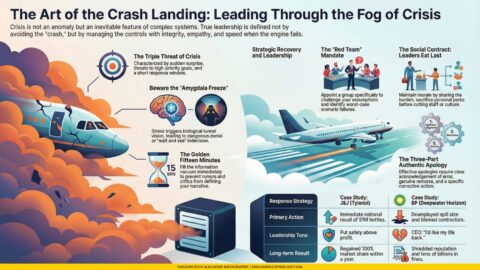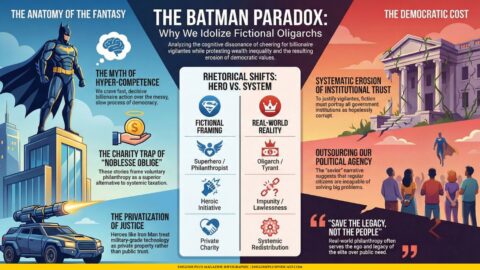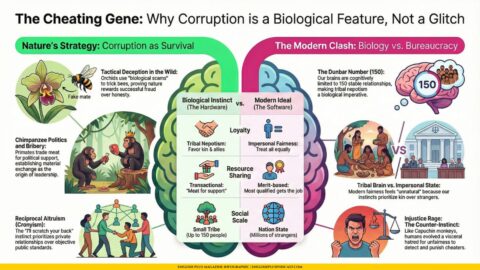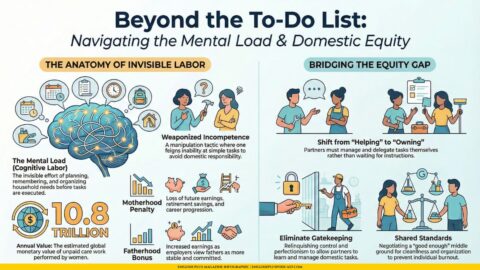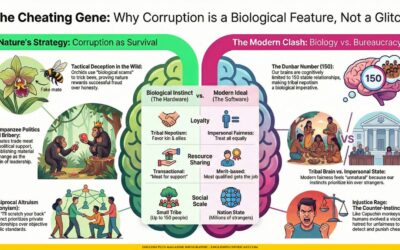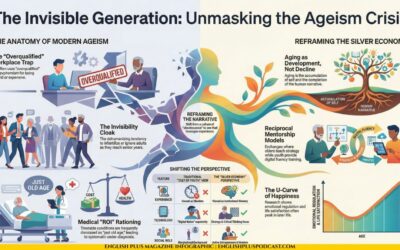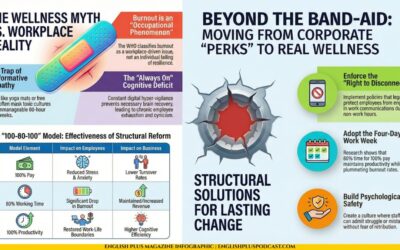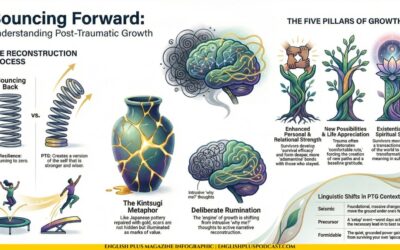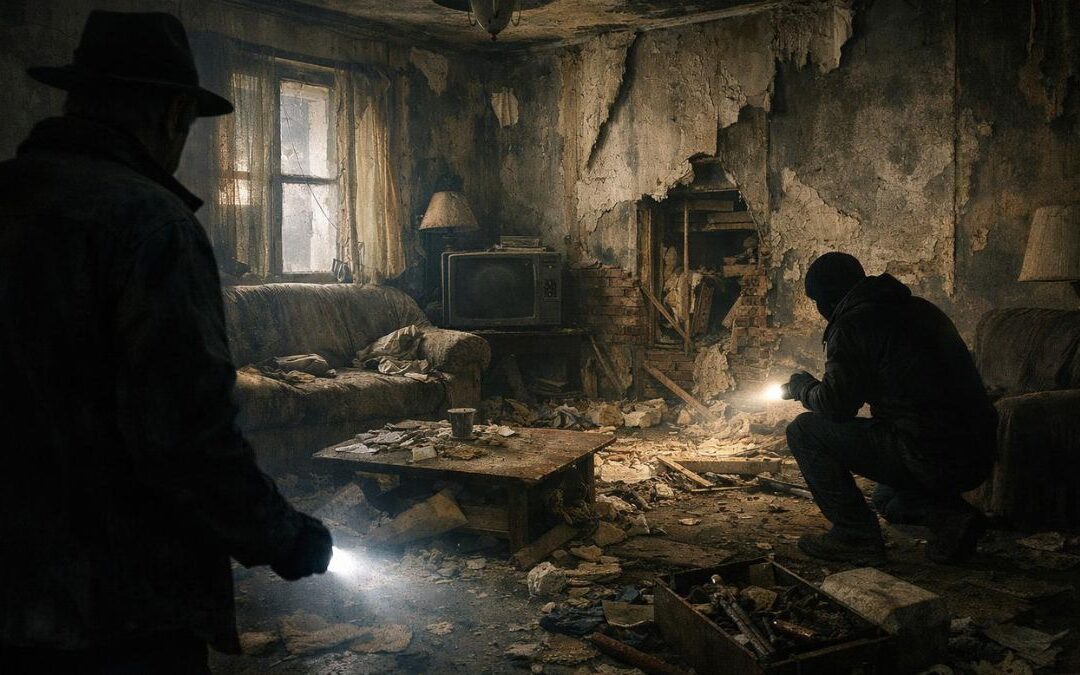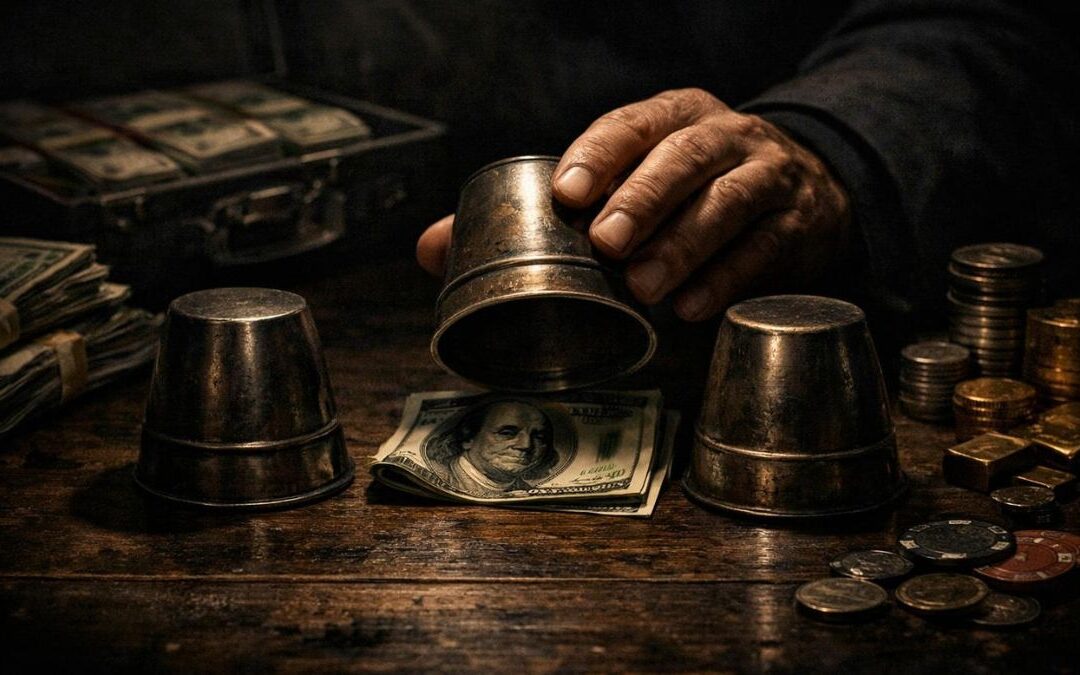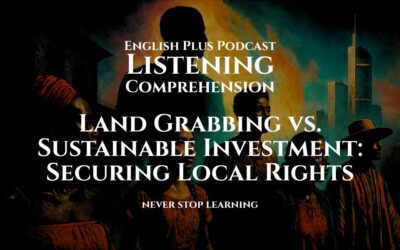English Plus Magazine
Dive into a world of ideas, stories, English and discovery.
Current Theme: Corruption and Oligarchy
Some of these articles are already published, and some will be published very soon. Check out the new articles below…
Letter from the Editor

The Lexicon of Larceny: A Etymological Deep Dive into the Language of Corruption
We need to talk about words. Not just any words, but the specific, often misused, and fascinatingly specific vocabulary we have developed to describe the act of ripping someone off. You see, when we talk about corruption, we tend to use these terms interchangeably—fraud, scam, scheme, racket—as if they are all just different flavors of the same ice cream. But technically, they aren’t. They are distinct species. Each word is a fossil, a trapped piece of history that tells us exactly how a specific crime was committed, who committed it, and, in some cases, the specific animal or element it reminded people of at the time.
I have been diving into the archives of criminal terminology—because that is what I do for fun on a Tuesday—and I realized that our language of theft is actually a history of ingenuity. It is a catalog of human creativity applied to the wrong things. When we use a word like “Gerrymandering” or “Ponzi scheme,” we are invoking ghosts. We are referencing specific historical figures who were so audaciously corrupt that they literally became the definition of the act. That is a kind of immortality, isn’t it? Not the kind you want, perhaps, but immortality nonetheless.
Let’s start with one of the most misused and mispronounced words in the political dictionary: Gerrymandering. Now, historically speaking, this is a fascinating portmanteau. Most people know it has something to do with redrawing district lines to favor a political party, but the specificity of the origin story is just delightful. It takes us back to 1812 in Massachusetts. The Governor at the time was a man named Elbridge Gerry. Now, pay attention to the phonetics here because this is where the “actually” factor comes in. Elbridge Gerry’s name was pronounced with a hard ‘G’, like “Gary.” So, technically, we should be saying “Gary-mandering,” not “Jerry-mandering.” The fact that the entire English-speaking world has softened that ‘G’ over two centuries is a linguistic tragedy, but I digress.
So, Elbridge Gerry—a Founding Father, by the way, a signatory of the Declaration of Independence, which makes this even more tragic—signed a bill that redistricted the state senate to benefit his own Democratic-Republican party. This wasn’t just a subtle nudge of the lines; it was a radical, bizarre reshaping of the map. One district in Essex County was so contorted, so twisted and wrapped around itself to capture specific voter blocs, that it looked ridiculous on paper.
Here is where the etymology gets visual. The story goes that at a dinner party, or perhaps in the editorial office of the Boston Gazette—sources vary on the exact location, but the result is the same—someone looked at the map of this weird, claw-like district. It is often attributed to the famous painter Gilbert Stuart, though that might be apocryphal. Whoever it was, they looked at the shape and said, “That looks like a salamander.” Another person, seizing the moment for a pun that would last centuries, replied, “No, better yet, a Gerry-mander.”
They combined the Governor’s name with the amphibian, and the Boston Gazette published a political cartoon depicting the district as a literal monster with claws, wings, and a dragon-like head, labeling it “The Gerry-mander.” The image went viral, in the 19th-century sense of the word. It stuck. It stuck so hard that we still use it today. But think about the nuance here: the word implies that the corruption creates a monster. It implies that when you manipulate the natural order of geography for gain, you birth a grotesque creature. It is a perfect metaphor, preserved in a portmanteau.
Now, let’s fast forward a century to the 1920s and talk about Charles Ponzi. People use “Ponzi scheme” and “Pyramid scheme” as synonyms, but technically, they are structurally different mechanics. A pyramid scheme relies on recruitment; you have to find new victims to pay the person above you. A Ponzi scheme, however, is a hub-and-spoke model. The fraudster is at the center, taking money from investors and paying “returns” to earlier investors with the money from newer investors. No one has to recruit anyone else; they just have to trust the central figure.
Charles Ponzi didn’t invent this “robbing Peter to pay Paul” dynamic—that idiom, by the way, dates back to the 14th century and refers to taking funds from St. Peter’s Church in Westminster to pay for repairs at St. Paul’s Cathedral in London—but Ponzi did it with such spectacular flair that he branded it forever. And the mechanism he used is incredibly nerdy. He wasn’t selling invisible land or fake gold mines. He was arbitraging international postal coupons.
This is the kind of detail I love. In the early 20th century, you could send a letter to another country and include an International Reply Coupon (IRC). The recipient could take this coupon to their local post office and exchange it for stamps to send a reply. But here is the glitch in the matrix: due to currency fluctuations after World War I, the cost of buying an IRC in a country with a weak currency (like Italy) was much lower than the value of the stamps you could get for it in a country with a strong currency (like the US).
Ponzi realized—or claimed to realize—that he could buy coupons in Italy for pennies, send them to the US, exchange them for dollars’ worth of stamps, and make a massive profit. Technically, on paper, the math worked. It was a legitimate arbitrage opportunity. The problem, and the reason it became a crime, was logistics. To make the millions he was promising investors, he would have needed to buy and transport practically every IRC in existence. There weren’t enough ships in the Atlantic to carry the amount of coupons he would need to back his claims. But the “hook” of the scheme was grounded in a real, technical loophole in international postal treaties. That is why it was so effective. It sounded smart. It sounded complex. It sounded like the kind of loophole a genius would find.
The lesson of the word “Ponzi” is that the most successful frauds often start with a kernel of complex, technical truth. He didn’t just say, “Give me money.” He said, “I have discovered a disparity in the Universal Postal Union’s pricing structure.” The specificity was the camouflage.
Let’s move to a pair of words that often get confused: Graft and Grift. They sound similar, they both involve taking things that aren’t yours, but their etymological roots take us in completely different directions.
“Graft” is a botanical metaphor. If you are a gardener, you know that grafting involves inserting a shoot or twig (the scion) into a slit on the trunk or stem of another plant (the stock), so they grow together. The word comes from the Old French graife, referring to a stylus or a pencil-like tool, because the shoot looked like a writing implement. So, how did this become a word for political corruption?
In the mid-19th century, the meaning shifted. It started to refer to “digging,” perhaps from the idea of digging a ditch—work that was often associated with corrupt municipal contracts. But the botanical metaphor is much more potent. Political graft is about inserting yourself into the flow of money. It is about attaching a foreign object (your private interest) onto the main trunk (the public treasury) so that you can siphon off the nutrients (taxpayer dollars). It implies a parasitic, yet structural, relationship. The grafter doesn’t destroy the tree; they just divert some of its sap to their own branch. That is why we use “graft” for things like kickbacks, bribery, and skimming off the top of construction contracts. It suggests a biological, systemic process.
“Grift,” on the other hand, has a much seedier, more performative origin. It appears in the early 20th century as American slang, likely from the underworld of carnivals and circuses. It might be a corruption of “graft,” but it evolved to mean something distinct: a confidence game. A “grifter” is not a politician skimming off a contract; a grifter is a con artist. They are the three-card monte dealer, the snake oil salesman, the person who sells you the Brooklyn Bridge.
The distinction is crucial. Graft is passive; it’s about positioning. You sit in the office and collect the toll. Grift is active; it’s about persuasion. The grifter has to work the mark. They have to tell a story. When we call a modern influencer a “grifter,” we are accurately identifying that their crime is one of performance. They are selling a persona, a fake reality, to extract value. If they were just stealing your credit card info, that would be theft. But if they convince you to give them your credit card info because they are a “Nigerian Prince” who needs help, that is a grift. It requires the victim’s participation.
Now, I want to talk about one of the most pervasive metaphors in the world of finance and fraud: Water. Have you ever noticed how aquatic our financial vocabulary is? We talk about “cash flow.” We worry about “liquidity.” If you have no money, you are “insolvent”—you cannot dissolve your debts. If your assets are unavailable, they are “frozen.” We put money in “offshore” accounts. We track “revenue streams.” We face “waves” of volatility. And, of course, when dirty money needs to be cleaned, we call it “money laundering.”
This isn’t accidental. Language is how we conceptualize abstract forces, and money, like water, is a fluid, powerful, life-giving, and destructive force that is difficult to contain. It seeks the path of least resistance. It leaks. It floods.
Let’s look at “Money Laundering.” The popular myth—and I have heard this repeated so many times it makes my teeth itch—is that the term comes from Al Capone buying a chain of laundromats to hide his illegal income. While it is true that mobsters often used cash-heavy businesses like laundromats and car washes to mix illegal cash with legitimate earnings, the term “money laundering” itself didn’t actually appear in print until the Watergate scandal in the 1970s. It is a relatively modern term.
However, the concept of “washing” money goes back further. The metaphor is about purification. You take “dirty” money—money stained by the crime that generated it, whether that is drug trafficking or embezzlement—and you run it through a cycle (a series of transactions) until it comes out “clean” and usable in the legitimate economy. The water metaphor holds up because the process is about dilution and mixing. You mix the dirty water with the clean water until no one can tell the difference.
“Offshore” is another fascinating one. Originally, it was quite literal. In the UK, the Channel Islands (like Jersey and Guernsey) were separate jurisdictions just off the shore. But today, “offshore” has detached from geography. You can be “offshore” in a landlocked country like Switzerland or Luxembourg. The word has evolved to mean “outside the legal jurisdiction of the chaotic mainland.” It implies a safe harbor, an island of calm where the taxman’s boat cannot dock.
We also have “slush funds.” This is a nautical term! In the 18th century, “slush” was the fat or grease skimmed off the top of the boiling meat pot in the ship’s galley. The cook would collect this slush and sell it to candle makers when the ship reached port. The money from this sale was the “slush fund,” a small stash of off-the-books cash used for petty luxuries or bribes. It wasn’t strictly illegal, but it was a perk of the job, a little bit of grease on the side. Over time, it grew to mean any reserve of money used for illicit or corrupt purposes, particularly in politics. But originally? It was literal pig fat.
And what about “embezzlement”? This word comes from the Old French besillier, meaning “to maltreat, ravage, or destroy.” But it is also linked to the idea of “bezel”—the groove in a ring that holds the gem. To “embezzle” originally meant to steal away, to filch. But the nuance is that embezzlement is an inside job. You cannot embezzle from a stranger. You can only embezzle money that you have been entrusted to hold. It is a violation of a specific relationship. It is the act of prying the gem out of the ring while you are supposed to be polishing it.
There is a psychological power in knowing these origins. When you understand that “bankrupt” comes from the Italian banca rotta—meaning “broken bench”—it changes the image in your mind. In medieval Italy, bankers conducted business on wooden benches in the piazza. If a banker failed to pay his debts, his bench was literally smashed to pieces by the authorities. He was put out of business physically. Today, bankruptcy is a pile of paperwork, but the word carries the memory of that splintering wood. It reminds us that financial failure was once a public, physical shame.
I could go on for hours about “nepotism”—from the Latin nepos, meaning nephew, referring to Catholic Popes giving high offices to their “nephews” (who were often their illegitimate sons). Or “cronyism,” which comes from the Greek chronios, meaning long-lasting, implying that you give jobs to your long-time friends.
But the point—the data point I want you to take away—is that our vocabulary of corruption is not abstract. It is physical. It is salamanders, ditches, grease, broken benches, and reply coupons. When we use these words correctly, we are not just describing a crime; we are diagnosing the specific pathology of the deceit. We are seeing the mechanics of the machine.
And in a world that is increasingly complex, where fraud is hidden behind algorithms and shell companies, holding onto the precise meaning of these words is a form of defense. It is a way of seeing clearly. If you know what a Ponzi scheme actually is, you are less likely to fall for one. If you know what Gerrymandering actually means, you can look at a map and see the monster staring back at you.
So the next time you read a headline about a scandal, don’t just skim past the words. Stop. Look at them. Ask yourself: Is this graft or grift? Is it a pyramid or a Ponzi? Dig into the etymology. Because the devil, as they say, is in the details—but so is the truth. And the truth is usually much, much weirder than you think.
Now, let’s pivot slightly to a set of words that are adjacent to fraud but live in the gray area of “high finance.” I want to talk about “Speculation” versus “Investment.” People use these interchangeably, but etymologically, they are observing the world from two different vantage points.
“Investment” comes from the Latin investire, which means “to clothe” or “to dress.” Think of the word “vestments.” When you invest, you are wrapping your capital into something. You are giving it a new form, clothing it in a business or an asset, expecting it to grow. It implies a sense of permanence and protection. You are covering the nakedness of your cash with a productive asset.
“Speculation,” on the other hand, comes from the Latin specula, meaning a watchtower or a lookout post. To speculate is to look out into the distance, to try to see what is coming before anyone else does. It is visual. It is about sight, not substance. The speculator isn’t clothing the money; they are climbing the tower to spot the ship coming in. It implies risk, distance, and observation. The speculator doesn’t care about the asset itself; they care about the movement of the asset. They are watchers, not builders.
This distinction helps us understand the 2008 financial crisis, or the crypto bubbles of recent years. Were people investing? No. They were speculating. They were climbing the watchtower, looking for the next wave, hoping to spot it before the guy in the next tower. Understanding that distinction changes how you read the market. It changes your own behavior. Are you dressing your money for the winter, or are you standing on a tower betting on the weather?
And while we are on the topic of markets, let’s look at “Bear” and “Bull.” Everyone knows Bulls go up and Bears go down, but the origin stories are delightfully chaotic. The “Bull” is easy—bulls attack by thrusting their horns upward. But the “Bear”? The most likely origin comes from a proverb about selling the bearskin before you have caught the bear.
In the 18th century, “bearskin jobbers” were middlemen who would sell skins they didn’t have yet, hoping the price would drop before they had to deliver them. They were short-sellers! They were betting on a decline so they could buy the skin cheaper later. So a “Bear” is essentially a pessimist who is betting against the hunter. It connects modern short-selling to the fur trade of the 1700s. Again, the market is a fossil record of trappers and hunters.
I also want to touch on the word “Sabotage.” It’s often used in corporate contexts—”they sabotaged the deal.” The popular story is that French workers threw their wooden shoes, called sabots, into the machinery of the textile mills to break them during industrial disputes. Now, technically, there is some debate among etymologists about whether they literally threw the shoes or if the word just meant “to walk clumsily” (clatter like a wooden shoe) and thus work poorly. But the image of the shoe in the gears is so potent. It reminds us that corruption isn’t always top-down (graft); it can be bottom-up. It can be the resistance of the cog against the machine.
Let’s go deeper into the “White Collar” crime designation. We accept this term without thinking, but it is a vestige of early 20th-century fashion. The term was coined by sociologist Edwin Sutherland in 1939. At the time, manual laborers wore blue denim shirts to hide dirt, while office workers wore starched white collars because they didn’t sweat or get dirty. The distinction was purely sartorial. But Sutherland’s genius was to point out that the man in the clean white collar could steal a thousand times more with a fountain pen than the man in the blue shirt could with a crowbar.
The term “White Collar” was a revolutionary sociolinguistic reframing. Before that, “crime” meant street crime. It meant muggings and burglaries. By inventing a category for the crimes of the respectable class, Sutherland forced society to look at corruption differently. He used a fashion trend to expose a moral blind spot. Words can do that. They can create a category where none existed, and in doing so, they make the invisible visible.
I want to end this section with a word that feels very modern but is actually ancient: “Audit.” We dread the audit. It sounds like a crunching of numbers. But the word comes from the Latin audire, meaning “to hear.” Think “audio.” In the days before widespread literacy and spreadsheets, accounts were checked orally. The steward would read the numbers out loud, and the lord or the examiner would listen. An audit was a hearing.
This brings a human element back into the cold world of finance. Originally, you had to look someone in the eye and speak your truth. You had to say the numbers. It is harder to lie when you are speaking than when you are typing. Maybe that is what we are missing today. Maybe we need to stop looking at spreadsheets and start making people say the numbers out loud. We need to bring the “audio” back into the audit.
You see? Every word is a rabbit hole. Every term is a trapdoor into history. And the more you know about where these words come from, the less likely you are to be fooled by the people using them against you. Language is a tool, but it is also a weapon. And in the battle against corruption, your best defense is a really, really good dictionary.
Let’s do one final rapid-fire round of “technically correct” definitions to arm you for your next dinner party argument about politics or business.
The “Scapegoat”: We use this for the guy who takes the fall for the corporate scandal. But the origin is biblical and ritualistic. In Leviticus, two goats were chosen. One was sacrificed, but the other—the scapegoat—had the sins of the community symbolically placed upon its head by the priest, and then it was sent out alive into the wilderness. Technically, the scapegoat escapes. It carries the burden of sin away, but it survives. In modern usage, the “fall guy” usually goes to prison, so he is actually the sacrificed goat, not the scapegoat. If we were being precise, the CEO who resigns with a golden parachute while the company collapses is the true scapegoat—he carries the sin away into the wilderness of his private island, alive and well.
“Sycophant”: The “Yes Man” who surrounds the corrupt leader. The etymology here is bizarre and disputed, but the most fun theory involves figs. It comes from the Greek sukon (fig) and phainein (to show). “Fig shower.” In ancient Athens, exporting figs was illegal at one point. A “sycophant” was someone who informed on people smuggling figs—they “showed the fig.” It evolved to mean a malicious accuser, and then eventually, a flatterer who seeks favor. But deep down, every suck-up in your office is technically a “fig revealer.”
“Propaganda”: We think of this as a bad word, associated with dictators. But it started with the Catholic Church. In 1622, Pope Gregory XV established the Congregatio de Propaganda Fide—the Congregation for Propagating the Faith. It was just a committee for missionary work. “Propaganda” just means “things to be propagated” or spread, like seeds. It was a gardening metaphor for ideas. It only became negative in the 20th century during the World Wars. Technically, any time you spread an idea, you are engaging in propaganda. The corruption comes from the content, not the act of spreading it.
“Gaslighting”: This is the word of the decade. But please, I beg you, use it correctly. It comes from the 1938 play Gas Light (and the 1944 movie). The husband tries to drive the wife insane by dimming the gas lights in the house and then denying that they are dimmer when she points it out. He makes her question her own sensory perception. Lying to someone is not gaslighting. Disagreeing with someone is not gaslighting. Gaslighting is a specific, sustained psychological manipulation to make someone question their sanity. It requires a power dynamic and a manipulation of the environment. If a politician says “I didn’t say that” when they are on video saying it, that is gaslighting. If they just spin the facts, that is just spin.
This is why I love this stuff. It clears the fog. It wipes the grease off the lens. When you are precise with your language, you become immune to the vague, emotional manipulation that corruption relies on. They want you to be angry and confused. They want you to yell “Fraud!” at everything. But Danny the Nerd knows better. The Nerd knows that is a Ponzi scheme, that is a grift, that is a slush fund, and that guy over there is just a fig shower.
And knowing the difference? That is the first step to fixing it. Or, at the very least, it makes reading the news a lot more interesting. Stay curious. Stay pedantic. And watch out for the salamanders.
Danny Ballan (The Nerd)
Editor-in-Chief
English Plus Podcast
English Plus Magazine
The Unpaid Shift: Why We Need to Talk About Equity at Home
Why does gender equality stop at the front door? We explore the “Second Shift,” the “Mental Load,” and why domestic equity is the next frontier of feminism.
Shadow Games Ep 5: Solutions to Corruption – Whistleblowers, Transparency, and Reform
In the finale of Shadow Games, we explore concrete solutions to political corruption. From protecting whistleblowers to the “Singapore Model” of governance, learn how societies clean house and restore trust.
Techno-Feudalism: Are We Becoming Serfs to Big Tech?
Discover how the digital economy mimics medieval feudalism. From the “rentier capitalism” of software subscriptions to the “precariat” of the gig economy, are we losing our ownership rights?
Shadow Games Ep 4: The Cost of Corruption – Infrastructure, Trust, and Meritocracy
Corruption isn’t just about money; it’s about lives. In Shadow Games Ep 4, we explore the human toll: crumbling infrastructure, the death of meritocracy, and the erosion of public trust. See the real-world impact of the Shadow Game.
The Cheating Gene: Is Corruption Natural in Humans and Animals?
From orchids lying to bees to chimps trading meat for votes, we explore the biological roots of corruption. Is bribery a human flaw or an evolutionary survival strategy?
Shadow Games Ep 3: The Oligarch’s Playbook – Media, Regulation, and Monopoly
Discover how the ultra-wealthy consolidate power in Episode 3 of Shadow Games. We explore the Media Monopoly, Regulatory Capture, and the “Too Big to Fail” phenomenon. A deep dive into the mechanics of modern oligarchy.
The Batman Paradox: Why We Idolize Fictional Oligarchs
Why do we cheer for billionaire vigilantes in movies but protest them in real life? Explore the “Batman Paradox” and what it reveals about our views on democracy, justice, and power.
Shadow Games Ep 2: The Shell Game – How Money Hides in Plain Sight
Uncover the secrets of the “Shell Game” in Episode 2 of Shadow Games. We explain how shell companies work, the truth about offshore tax havens, and how “Dark Money” influences politics without leaving a trace. A guide to financial opacity.
The Dictator’s Aesthetic: Why Corrupt Regimes Build the Same Cities
Explore the link between architecture and corruption. From ghost stadiums to pencil towers, discover how authoritarianism and money laundering shape our skylines in this deep-dive article.
Shadow Games Ep 1: Lobbying vs. Bribery – When Does Advocacy Become Corruption?
Explore the murky world of political influence in Shadow Games Ep 1. We breakdown the fine line between legal lobbying and bribery, the revolving door, and the pay-to-play reality of modern power. Essential reading for understanding how governments really work.
Why Your Coffee Gets Cold: A Guide to the Laws of Thermodynamics
Why does disorder always increase? We break down the Laws of Thermodynamics, from energy conservation to the Heat Death of the universe, and why you can never win against entropy.
The Hybrid Conundrum: How to Survive the Half-Remote, Half-Office Mess
Are you struggling with a hybrid team? We explore Proximity Bias, the death of the watercooler, and why “Asynchronous Communication” is the secret to managing the chaos of the modern workplace.
The Invisible Generation: Why We Must Challenge Ageism and Embrace the Future Self
Ageism is the last acceptable prejudice. We explore the “cult of youth,” workplace discrimination, and the “Silver Economy,” challenging how society devalues the elderly.
The Corporate Mental Health Day: Genuine Progress or Just a PR Stunt?
Is your company’s “Wellness Wednesday” actually helping, or just a Band-Aid on burnout? We analyze the disconnect between corporate mindfulness perks and the reality of the 80-hour work week.
Post-Traumatic Growth: How We Break, How We Heal, and How We Become Stronger
Trauma doesn’t just damage us; it can transform us. Explore the psychology of Post-Traumatic Growth (PTG), the art of “Kintsugi,” and why bouncing forward is better than bouncing back.
Magazine Series
Shadow Games Ep 5: Solutions to Corruption – Whistleblowers, Transparency, and Reform
In the finale of Shadow Games, we explore concrete solutions to political corruption. From protecting whistleblowers to the "Singapore Model" of governance, learn how societies clean house and restore trust.
Shadow Games Ep 4: The Cost of Corruption – Infrastructure, Trust, and Meritocracy
Corruption isn't just about money; it's about lives. In Shadow Games Ep 4, we explore the human toll: crumbling infrastructure, the death of meritocracy, and the erosion of public trust. See the real-world impact of the Shadow Game.
Shadow Games Ep 3: The Oligarch’s Playbook – Media, Regulation, and Monopoly
Discover how the ultra-wealthy consolidate power in Episode 3 of Shadow Games. We explore the Media Monopoly, Regulatory Capture, and the "Too Big to Fail" phenomenon. A deep dive into the mechanics of modern oligarchy.
Shadow Games Ep 2: The Shell Game – How Money Hides in Plain Sight
Uncover the secrets of the "Shell Game" in Episode 2 of Shadow Games. We explain how shell companies work, the truth about offshore tax havens, and how "Dark Money" influences politics without leaving a trace. A guide to financial opacity.
Shadow Games Ep 1: Lobbying vs. Bribery – When Does Advocacy Become Corruption?
Explore the murky world of political influence in Shadow Games Ep 1. We breakdown the fine line between legal lobbying and bribery, the revolving door, and the pay-to-play reality of modern power. Essential reading for understanding how governments really work.
More in English Plus Magazine
Danny's Stories
The Keeper of the Spring | Complete Story and Analysis: Summary, Themes, & Study Guide
What happens when progress destroys tradition? Dive into Danny’s “The Keeper of the Spring” story and analysis for a full summary, character guide, and theme breakdown.
The Memory Pawnshop | The Story and The Crucible
A cyberpunk short story by Danny Ballan about a man who trades his painful memories for success—only to discover that resilience, empathy, and humanity cannot be bought without suffering.
The Lovers of No Man’s Land | Novella
In a world divided by war, two lovers from enemy nations find each other, only to be accused of espionage. Their romance is twisted into a tale of treason, leading them through brutal interrogations and trials as diplomats negotiate a peace that may come too late. A tragic story of love, sacrifice, and a legacy that ultimately transcends the borders that condemned them.
Chalk on Elias’s Mind | A Short Story by Danny Ballan
A man’s quest for revenge on his cruel headmaster shatters in an instant of unexpected pity. Read the short story “Chalk on Elias’s Mind” by Danny Ballan, followed by a complete author-led deep dive into its themes of memory, power, and the true meaning of confrontation.
Short Stories | The Weight of an Empty Room
Explore the profound weight of grief and memory in “The Weight of an Empty Room.” Follow Elara as she confronts her late husband’s study, uncovering hidden secrets and navigating the path toward integrating loss into life. A literary short story about love, absence, and discovery.
The Unseen Flowers of War: Finding Humanity in the Rubble
Have you ever felt disconnected from poetry, like it's a secret language only a few can understand? In this episode, we're breaking down those barriers and diving into the powerful and deeply relatable poem "War Child." Forget the jargon and philosophical nonsense –...
Learn English
Master of Disguise: The High-Stakes Art of Natural Deception
Explore the fascinating world of mimicry, where nature’s greatest con artists use deception to survive. From harmless flies posing as deadly wasps to octopuses vanishing in plain sight, discover the science behind these evolutionary illusions.
The Fiddle That Never Played: Why We Get Nero Wrong
Did Nero really play music while Rome burned to ash? We dig into the historical evidence to separate fact from fiction and discover why this ancient rumor still shapes our view of power and truth today.
The Alchemy of Agony: Why We Need Suffering to Grow
Can suffering actually be good for you? We explore the uncomfortable truth that pain, while unpleasant, is often the secret ingredient for wisdom, resilience, and a truly meaningful life.
Waking Up the World: How the Renaissance Remade Reality
Dive into the Renaissance, the explosive era that bridged the medieval and modern worlds, transforming art, science, and the very essence of human potential.
Reflections in the Obsidian: Dancing with Tezcatlipoca, the Lord of the Smoking Mirror
Discover the chaotic allure of Tezcatlipoca, the Aztec god of destiny and sorcery. We dive into the myths of the Smoking Mirror to uncover ancient wisdom about fate, duality, and the unpredictable nature of life.
Land Grabbing vs. Sustainable Investment: Securing Local Rights | Listening Comprehension
Explore the complex issue of foreign land acquisition. This advanced listening practice (IELTS/TOEFL) examines ‘land grabbing’ and contrasts it with solutions like community ownership and legal frameworks.


